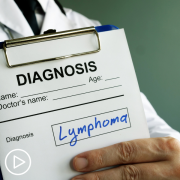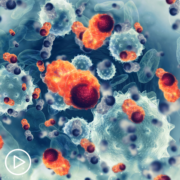What Factors Are Considered When Choosing a Follicular Lymphoma Treatment?
What Factors Are Considered When Choosing a Follicular Lymphoma Treatment? from Patient Empowerment Network on Vimeo.
Dr. Tycel Phillips provides insight on how to personalize follicular lymphoma treatment decisions. Dr. Phillips discusses the efficacy of some treatment combinations and which factors impact the decision to begin treatment.
Dr. Tycel Jovelle Phillips is a Medical Oncologist in the Hematology Clinic at The University of Michigan Rogel Cancer Center. Learn more about Dr. Phillips, here.
See More from The Pro-Active Follicular Lymphoma Patient Toolkit
Related Programs:

|

What Is the Patient’s Role in Follicular Lymphoma Decisions? |

What Treatment Options Are Available for Relapsed Follicular Lymphoma? |
Transcript:
Katherine:
What is considered when choosing a treatment? Are there test results that can impact the options?
Dr. Phillips:
So, there are. So, for the most part we’ll take a couple of things into consideration. So, there is no standard of care for follicular lymphomas. So, there are a couple different options that can be utilized in the upfront setting for the untreated patient. So, comorbidities play a part in what sort of treatment we choose. Patient’s age and fitness will play a part. If there’s any heart disease, that will play a part in the situation as well. And also, as I said, stage will play a part in sort of what our treatment goals are.
So, if our treatment goal for a really unfit patient who we don’t think can tolerate chemotherapy, it’s just symptom control. And they don’t have a lot of disease, we can sometimes treat them with just a monoclonal antibody we call Rituximab as a single agent.
If the patient has a lot of disease, and they are a fit patient, we will tend to combine Rituximab with several different chemotherapy regimens. Because Rituximab plus chemotherapy works better than chemotherapy and also Rituximab alone, especially depending on the amount of the disease that we’re trying to treat. And again, as I mentioned before, if it’s a localized patient there is known to be radiation plus or minus Rituximab in that situation.
But because of some of the side effects of the drugs we use, and obviously now we’re in a pandemic, a lot of those will take sort of some of the consideration of what we use. Some of the drugs that we use are either more sort of immunosuppressants than others, and obviously being in a pandemic, we have to take that into consideration because we’re not treating to cure. Some of the drugs can cause heart damage, some of the drugs can damage nerves, some of the drugs include steroids, which might be prohibited with some patients. So, all that sometimes has to be taken into consideration when we choose our regimen.
Katherine:
Yeah. It sounds like there are a lot of factors coming into play here.
Dr. Phillips:
Yeah, I mean normally, without a pandemic there’s a lot of factors, and the pandemic just makes things a little bit harder. Just because, again, our patients are already at risk based with some of the treatments we choose.
Katherine:
Yeah. Yeah. It’s pretty challenging right now. Does treatment typically start right away?
Dr. Phillips:
So, that really depends on a stage and also whether we meet certain sort of criteria to treat. So, we don’t have to treat right away. So, if a patient has a disease, and the disease is not in an area where we think it’s curative, for the most part we can enter into what we call a watch and wait. Meaning we will observe a patient very closely and defer treatment until the patient develops symptoms or other indications that warrant treatment.
We do know that there is no impact on longevity by sort of partaking in this approach. So, you won’t live any longer or you won’t live any shorter if we watch and wait versus initiating therapy right away. It just saves you from having some of the toxicities from treatment without any real major benefits.
So, remember the goal for most patients with follicular lymphoma is to alleviate symptoms or problems. If you don’t have a symptom or a problem, me giving you treatment is not going to make you feel any better. Actually, it would probably make you feel a little bit worse. To get you back to where you were when you started.






![[ACT]IVATED DLBCL Resource Guide [ACT]IVATED DLBCL Resource Guide](https://powerfulpatients.org/wp-content/uploads/ACTIVATED-DLBCL-Resource-Guide-180x180.png)



